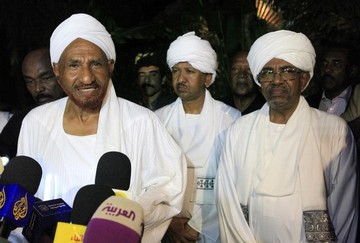Sudan’s NUP chief says opposition too divided to pose threat to regime
October 15, 2013 (KHARTOUM) – The head of the National Umma Party (NUP) Sadiq Al-Mahdi has pointed criticism at both the ruling National Congress Party (NCP) and opposition parties suggesting that both sides have stagnated creating a political stalemate in the country.

The former prime minister went on to say that armed opposition managed to exhaust the government through attrition but that its formation and alliances do not make it an acceptable national alternative in the eyes of the people.
The youth anti-regime movements, he said, are “widespread” and “effective” but requires complementary action to succeed and programme that determines the “features of the new regime”.
Al-Mahdi said that other non-military opposition parties have too many disagreements which has prevented it from formulating a “meaningful alternative program and an effective command structure”.
Despite this, the NUP leader said that a significant change has swept the political landscape including mounting public dissenting views within the NCP from prominent figures and vital state structures.
Another development is that armed rebel groups have also come to realize that to achieve their goals they need to support a political solution, al-Mahdi said.
Furthermore, al-Mahdi said that opposition parties acknowledge that simply uniting against the NCP-led regime will not get them very far.
Al-Mahdi concluded that these developments will result in the emergence of a new anti-regime alliance that agrees on a roadmap that determines future steps and means to achieve their goals which could include general strike or civil disobedience.
If that occurs, then certain state institutions may join that movement or the regime may proactively surrender to the demands of implementing political reforms.
“This ruling regime in Sudan stands at an impasse. From the inside and outside multiple arrows are targeting it, and one of them is bound to [fatally] hit it. One of these arrows and its safest…a national uprising or a roadmap through a roundtable,” the NUP leader said.
This month, one of the deadliest wave of protests in Sudan’s history erupted against the government decision to cut fuel subsidies and hike prices of gasoline and diesel.
The NUP along with other major opposition parties stayed on the sidelines during the unrest.
Authorities said that around 70 people were killed in the demonstrations but opposition and activists put the death toll at more than 200.
More than 30 NCP figures and supporters sent a memo to president Omer Hassan Al-Bashir criticizing the violent crackdown on protesters and calling for reinstating the fuel subsidies saying it “harshly” impacted on Sudanese citizens.
“The legitimacy of your rule has never been at stake like it is today” they said in their letter to Bashir which was seen as a direct challenge to the president who is now the country’s longest serving leader.
Bashir ordered an investigation of the signatories and established a committee for that purpose amid reports that they could be dismissed or suspended from the party.
Several of signatories refused to appear before the commission and said they are prepared to fight to defend their views.
In a related issue, opposition sources said that authorities released head of the Sudanese Congress Party Ibrahim al-Sheik and Sidgi Kaballo who is a leading figure in the communist party.
The Sudanese interior ministry said that around 700 people were arrested in connections with the riots which saw vandalizing of gas stations and public transportation buses.
Khartoum denied that its security forces have used live ammunition and suggested that rebels from the Sudan Revolutionary Front (SRF) infiltrated the protests and carried out the killings.
(ST)
